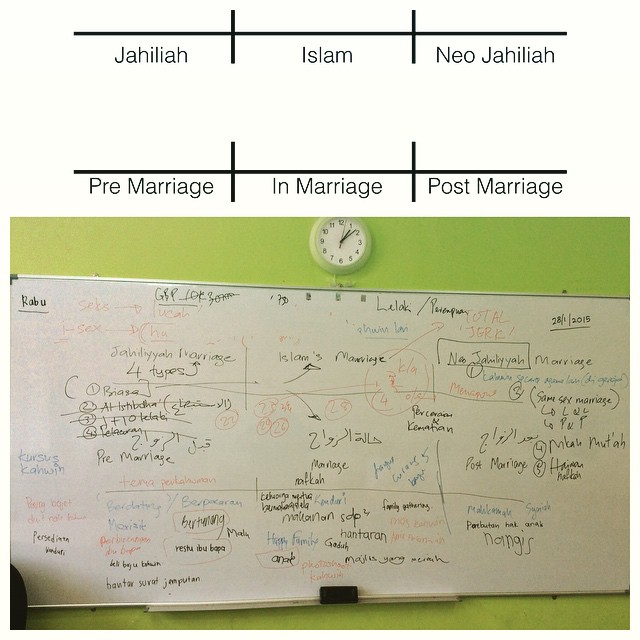Can the learning of Fiqh being transformed from a teacher centered essentialism into a learner centered progressivism?
I don’t have an immediate answer.
But what I understand from the Sirah, it was obvious that during the time of the Prophet Muhammad PBUH, there was no text books, no structured course outline, no standardized assessments. There was no mass instruction.
But that does not mean, a structured learning is wrong. I never intended it to be understood like that. What I want to emphasize here, education is a process of instilling progressively something into a person. Having a structured content, should not let the dynamism of learning disappeared. Therefore, I believe that our 2015 Curriculum Transformation is workable, even for a perennialistic subjects like Fiqh.
Today, I had my chance to explore this when I substituted our Fiqh teacher who had an emergency. The topic was Fiqh Munakahat.
I began my class by asking them what are the things that they’ve learnt from last week session. I required them to reply in related vocabularies, knowing that our students still have problems dealing with constructing ideas in sentences. They gave me the answer and one of them was the Rukun of Nikah.
When I asked them if they can remember all the Rukun of Nikah, most of them looked reluctant. I said, “if you can understand what does the word Rukun means, and why it’s being used frequently in many aspects of Fiqh, then remembering it will be easier, and less confusing when it comes to Syarat and other stuffs.
What are the other Rukun they can remember?
They gave me all sorts of Rukun such as Rukun Solat, Rukun Haji, Rukun Negara and the list goes on.
Rukun is pillar.
Pillars are something that without them, the main structure can never exist. A house can stand without a window, but not without pillars. So, pillars mean something that are so important which you cannot imagine the existence of one without them.
You cannot imagine Hajj without Wuqf in Arafah.
You cannot imagine Prayer without Qiyam, reciting al-Fatihah, or Sujud.
Similar to the fact that you cannot imagine a building without the pillars.
That was the first five minutes of the discussion. I didn’t want to touch too much on the topic because I want them to continue it with the appointed teacher, next session Insha-Allah.
I took the opportunity to investigate the learners’ idea about marriage itself. So, I divided the discussion into two sets of topic.
First, I drew a line and divide it into three columns, named “Jahiliyyah”, “Islam” and “Neo Jahiliyyah”. The second line was divided again into three columns, named “pre marriage marriage”, “in marriage” and “post marriage”. The students are required to share whatever they can think about the divisions. Write, whatever you want to write. Do not worry if they are right or wrong.
Alhamdulillah, the ‘entire world of marriage’ came forward and written on the whiteboard. All sorts of thing! Beyond your imagination. It is not my position to judge if their answers are right or wrong at this stage, but I have to assist them to analyze the words they and their friends shared.
We talked about all the vocabularies.
It was really fun, sometimes sad, in many ways it was awkward too, and once a while, it freaking me out.
Married to a bridge?
What is that?
Then, we decided to identify all those words on the whiteboard if they are ADAT (custom) or SYARIAT.
“Akad?”
“Syariat!”
“Reception’s color theme?”
“Adat!”
“Headache to do the financial budget?”
“Syariat! Adat! Syariat! Adat!” they got confused.
I asked the girls, “do you want to get married to a man who is good looking but fail to sort out the budget?”
“They agreed with one solid answer, “NO!!!”
It was a very good session. My advice to myself and other teachers who want to adopt the learner centered instruction, “do not overestimate your students’ current knowledge that you fail to make the topic simple, and do not underestimate your students’ capability to learn”
Appreciate and acknowledge what they already know. Let them realize that they actually know a lot of things related to the subject. Then, we discuss them, and finally we suggest them to reconstruct the outcome to a more structured knowledge by reading the suggested further reading materials, if there’s any.
Discussion was ended with a heavy topic related to neo Jahiliyyah marriage involving the same sex marriage, nikah mut’ah, and some other super rare examples.
We do not talk too much on the rule of fiqh regarding these types of marriage (because we already subconsciously categorized them as neo jahiliyyah), but we discussed a little bit about the causes that lead a person into these types of un-islamic marriage.
Why a man finally attracted to another man? Why a woman is attracted to another woman? The causes occurred at the age of ignorance, but the implications remain for the entire life. Class ended with “take a very good care of our aurat, interaction and character shaping”.
Wallahu a’lam.
I enjoyed every bit of the class, Alhamdulillah.


Wow, masha Allah! What a wonderful explanation. Hope that Ustaz will get more opportunities being a ‘bidan terjun’, as the students will benefit your presence.
Looking forward to reading more inspirational stories from you, Ustaz.
Wassalam.
Asslm Ustaz…all these make me want to go back to school! May Allah grant you and all teachers in KMSS istiqamah and sabr in dealing with our kids. Barakallahufeeq.
How I wish to like and share and re-tweet this post!